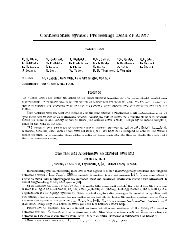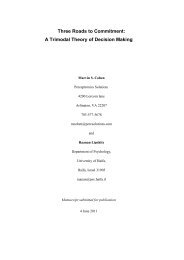Three Roads to Commitment: A Trimodal Theory of Decision Making
Three Roads to Commitment: A Trimodal Theory of Decision Making
Three Roads to Commitment: A Trimodal Theory of Decision Making
Create successful ePaper yourself
Turn your PDF publications into a flip-book with our unique Google optimized e-Paper software.
<strong>Three</strong> <strong>Roads</strong> <strong>to</strong> <strong>Commitment</strong>: A <strong>Trimodal</strong> <strong>Theory</strong> <strong>of</strong> <strong>Decision</strong> <strong>Making</strong> 53<br />
conclusion: alternative theories <strong>of</strong> uncertainty in intelligence analysis. Falls Church, VA: <strong>Decision</strong> Science<br />
Consortium, Inc.<br />
Cohen, M., Laskey, K.B., Chinnis, J.O., Jr., & Ulvila, J.W. (1986). Report on uncertainty models: identification and<br />
critical analysis <strong>of</strong> models <strong>of</strong> uncertainty with potential applicability <strong>to</strong> intelligence data bases. Falls<br />
Church, VA: <strong>Decision</strong> Science Consortium, Inc.<br />
Cohen, M., Freeman, J.T., & Wolf, S. (1996). Meta-recognition in time stressed decision making: Recognizing,<br />
critiquing, and correcting. Human Fac<strong>to</strong>rs, 38(2), 206-219.<br />
Cohen, M.S., Freeman, J.T., & Thompson, B.B. (1998). Critical thinking skills in tactical decision making: A model<br />
and a training method. In J. Cannon-Bowers & E. Salas (Eds.), <strong>Decision</strong>-<strong>Making</strong> Under Stress:<br />
Implications for Training & Simulation (pp. 155-89). Washing<strong>to</strong>n, DC: American Psychological<br />
Association.<br />
Cohen, M. S., & Thompson, B. B. (2001). Training teams <strong>to</strong> take initiative: Critical thinking in novel situations. In<br />
E. Salas (Ed.), Advances in Human Performance and Cognitive Engineering Research (Vol. 1, pp. 251-91).<br />
Amsterdam: JAI.<br />
Cohen, M.S., Adelman, L.A., Bresnick, T., Freeman, F.M., Salas, E., & Riedel, S. (2006). Dialogue as a medium<br />
(and message) for training critical thinking. In R. H<strong>of</strong>fman (Ed.), Expertise Out <strong>of</strong> Context, pp. 219-261.<br />
Mahwah, NJ: Erlbaum.<br />
Cohen, M. S., de Visser, E., Freedy, E., Freedy, A., LeGoullon, M., & Weltman, G. (2008). Intuitive and analytic<br />
support for decision making. Paper presented at the Conference on Human Centered Processes, Delft, The<br />
Netherlands.<br />
Connolly, T., & Wagner, W. (1988). <strong>Decision</strong> cycles. In R. Cardy, S. Puffer & M. Newman (Eds.), Advances in<br />
Information Processing in Organizations (Vol. 3, pp. 183-205). Greenwich, CT: JAI Press.<br />
Cross, N. (2006). Designerly ways <strong>of</strong> knowing. New York: Springer Verlag.<br />
Cross, N., (2007). Forty years <strong>of</strong> design research, Design Studies 28, 1-4.<br />
Dawes, R. M. (1979). The robust beauty <strong>of</strong> improper linear models in decision making. American Psychologist, 34,<br />
571-582.<br />
Dawkins, R. (2006). The Selfish Gene. Oxford: Oxford University.<br />
de Finetti, B. (1964). Foresight: Its logical laws, its subjective sources. In J. Kyburg, H.E. & H. E. Smokler (Eds.),<br />
Studies in Subjective Probability. New York: Wiley.




